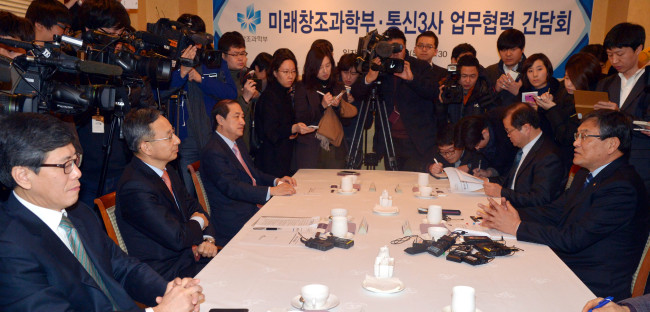The country’s telecom minister vowed to take all-out measures against the deep-rooted business malpractice in the telecom sector to eradicate excessive and illegal smartphone subsidies by the nation’s telecom operators.
“Telecommunication is one of the basic rights of the people. Accordingly, it is inevitable for the government to punish (the mobile carriers) if they do not stop paying out subsidies,” said Science, ICT and Future Planning Minister Choi Mun-kee after a meeting with the CEOs of the three local mobile carriers SK Telecom, KT and LG Uplus.
 |
Science, ICT and Future Planning Minister Choi Mun-kee (first of right line) discusses a plan to root out illegal subsidy practices with CEOs of the country’s three mobile carriers at the Plaza Hotel Seoul on Thursday. (Kim Myung-sub/The Korea Herald) |
In a bid to root out smartphone subsidies, the ministry will impose the strongest-ever sanctions on the three carriers as the subsidy war has continued despite hefty fines.
Starting from next week, the government will impose a suspension of business operations of over 45 days on the three telecom operators. This time, two operators will be suspended at once.
“The CEOs should be responsible for the excessive subsidies until the revisions to the Telecommunications Laws pass,” the minister said.
If a mobile carrier continues to dole out incentives to snatch each other’s customers during the suspension, its CEO could face up to three years in prison and the company could be fined up to 150 million won ($140,000), said Kim Joo-han, head of the ICT Ministry’s Telecommunications Policy Bureau.
The ministry also asked the companies to prepare a measure of how to address the subsidy issue and make it public.
The three operators understood the seriousness of the issue and all agreed that the company that leads the cutthroat battle should be punished severely, Kim said.
KT CEO Hwang Chang-gyu, who took office in January, said, “Excessive subsidy practices in the telecom market should be eliminated.”
“Too much focus on the subsidy prevents companies from investing in other areas and making forays into global markets,” he added.
At the meeting, the minister and three CEOs also discussed how to lower communications costs.
“The handset price is so bloated and domestic consumers pay much more than overseas consumers,” Choi said.
He asked both handset makers and mobile carriers to reduce the price by about 20 percent with concerted efforts.
“As handset prices largely affect communications cost, smartphone makers should also make efforts to lower prices,” Kim Joo-han said.
By Shin Ji-hye (
shinjh@heradlcorp.com)








